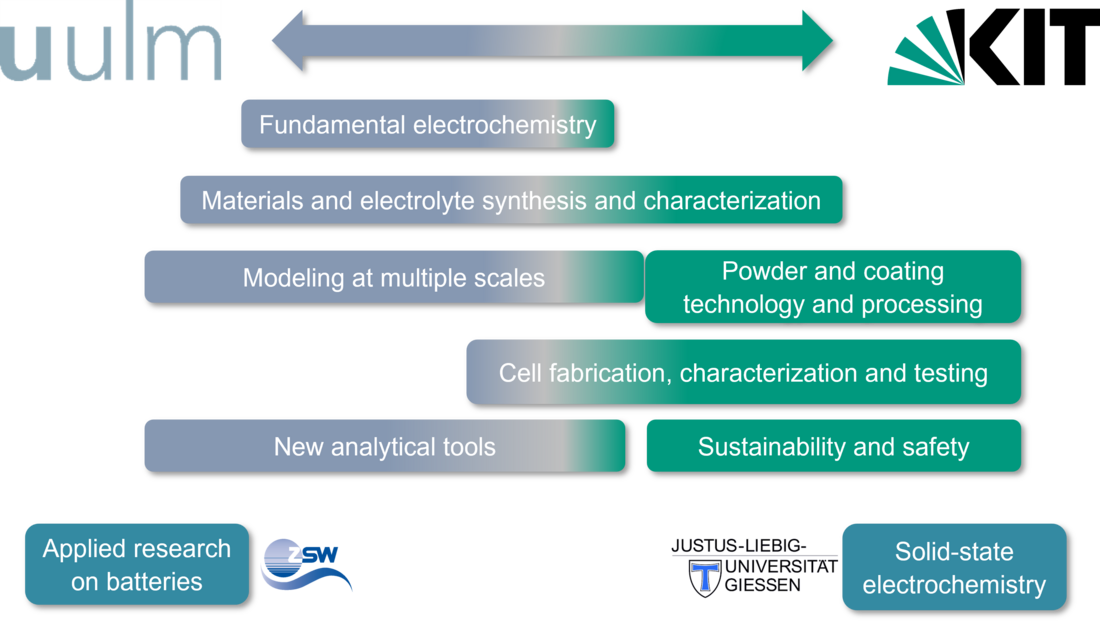Partners

Partners
The complementary expertise from Ulm University and Karlsruhe Institute of Technology (KIT) is strengthened by experts from the Justus-Liebig-University Giessen (JLU) and the Centre for Solar Energy and Hydrogen Research Baden-Württemberg (ZSW).
KIT combines the traditions of a renowned technical university and a major large-scale research institution in a very unique way. In research and education, KIT assumes responsibility for contributing to the sustainable solution of the grand challenges that face the society, industry, and the environment. For this purpose, KIT uses its financial and human resources with maximum efficiency. The scientists of KIT communicate the contents and results of their work to society.
Engineering sciences, natural sciences, the humanities, and social sciences make up the scope of subjects covered by KIT. In high interdisciplinary interaction, scientists of these disciplines study topics extending from the fundamentals to application and from the development of new technologies to the reflection of the relationship between man and technology. For this to be accomplished in the best possible way, KIT’s research covers the complete range from fundamental research to close-to-industry, applied research and from small research partnerships to long-term large-scale research projects. Scientific sincerity and the striving for excellence are the basic principles of our activities.
Worldwide exchange of knowledge, large-scale international research projects, numerous global cooperative ventures, and cultural diversity characterize and enrich the life and work at KIT. Academic education at KIT is guided by the principle of research-oriented teaching. Early integration into interdisciplinary research projects and international teams and the possibility of using unique research facilities open up exceptional development perspectives for our students.
The development of viable technologies and their use in industry and the society are the cornerstones of KIT’s activities. KIT supports innovativeness and entrepreneurial culture in various ways. Moreover, KIT supports a culture of creativity, in which employees and students have time and space to develop new ideas.
Ulm University was founded in 1967 . An attractive and seminal course catalogue, high standard of education, internationality, interdisciplinarity and top-level innovative research have become trademarks of Ulm University.
Ulm University is being funded in battery research by the Excellence Strategy of the federal and state governments.
Over 10,000 students receive thorough education and support in 4 faculties . The Faculties of Medicine, Natural Sciences, Mathematics and Economics and Engineering, Computer Sciences and Psychology offer more than 60 study programmes , some of them taught in English. Internationally , Ulm University stands out with its particularly comprehensive support for international students. The quality of teaching has a high priority at Ulm University. Quality standards and goals are settled in the Teaching Mission Statement .
Continuing academic education offers qualifications for working professionals. Modularised master’s programmes teach specialised skills as well as management know how, research expertise and leadership skills. Their didactic concept is based on actual results from teaching and learning research.
Ulm University is a green campus university and belongs to a dynamic region with a strong economy. The University is an important driving force behind the Science City Ulm and partner in numerous cooperations with industry, economy and other institutions on a regional, national and international level.
Ulm University dedicates itself to 12 strategic research topics , most of which are interdisciplinary. Important research fields are the life sciences and medicine, bio-, nano- and energy materials, financial services and their mathematical methods as well as information, communication and quantum technologies.





